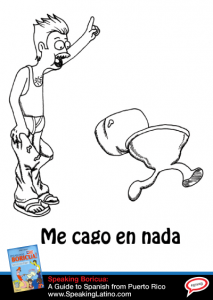Life is not as simple as we wish. Sometimes things do not work out the way we planned. This is when colorful language flies and we use curse words/phrases to relieve stress. In this post I will teach you some useful Puerto Rican profanities, with a twist. I’m featuring seven swear phrases from my beloved Island of Puerto Rico and the eufemismos (euphemisms) we use to soften the language when the real thing is not appropriate.
Understand More Puerto Ricans!
Some of these phrases are featured in the book Speaking Boricua: A Practical Guide to Puerto Rican Spanish.
Puerto Rican Spanish Slang Bad Words and Phrases
☠ CAREFUL! ORIGINAL EXPRESSION
☺ EUPHEMISM OR VARIATION THAT SUBSTITUTES THE ORIGINAL OFFENSIVE PHRASE
1. ☠¡Qué jodienda! ☺¡Qué chavienda!
Joder means to fuck around with, to bother, to annoy. This is one of those words that the nastiness will depend on the tone of how you are saying it. Obviously, it is not an appropriate word to use all the time. The words used to soften down joder are jorobar and chavar.
Other variations: ¡Qué mucho jodes! (¡Qué mucho jorobas! or ¡Qué mucho chavas!), ¡No jodas más! (¡No jorobes más! or ¡No chaves más!), ¡Me jodí yo ahora! (¡Me chavé yo ahora!)
 2. ☠¡Me cago en ná! ☺¡Me caso en ná!
2. ☠¡Me cago en ná! ☺¡Me caso en ná!
This phrase is rampant among Puerto Ricans and is short for Me cago en nada or the equivalent of damn! or shit! Boricuas use this phrase when forgetting something or doing something incorrectly. It is a catch-all phrase also used to express surprise or frustration. To soften, substitute cago (shit) for caso -that in this case doesn’t make any sense in the context of the sentence; it is just a word that rhymes. A translation for caso in English could be to marry or a case.
Other variations: ¡Me cago en la potoroca! (¡Me caso en la potoroca!), ¡Me cago en la perra de Marta! (¡Me caso en la perra de Marta!)
3. ☠¡Maldita sea la madre que te parió! ☺¡Maldita sea la perra de Marta!
This is a harsh phrase because it is directed at someone else (or even something else) when he/she/it pisses you off badly. This phrase means literally “Dam the mother fucking bitch who gave birth to you”. I remember that my mom used this one sometimes with an extra bonus like this: ¡Maldita sea la madre que te parió y te pujó! The way I learned to convert this to a PG-13 rating was to change la madre que te parió for la perra de Marta. Why, how or even when la perra de Marta (Martha’s female dog) became involved is unknown. As a footnote, Puerto Rican pronunciation of the R in Marta changes to an L as in Malta.
Other variations: ¡Maldita sea la madre!, ¡Sea la madre!
4. ☠¡Vete pa’l carajo! ☺¡Vete pa’l cará! ☺¡Vete pa’ la porra!
This expression means Go to hell!. The word carajo has an interesting origin. The popular explanation is that carajo is the crow’s nest on a ship’s mast used as an observation point, certainly not a pleasant location where cold and dizzy would be permanent sensations. You may also hear this phrase using the verb largar: ¡Lárgate pa’l carajo! or ¡Lárgate pa’l cará!
Other variations: Use the following phrase as an expression of surprise: ¡Anda pa’l carajo! (¡Anda pa’l candao! or ¡Anda pa’l cará!). ¡Ay carajo! (¡Ay caramba!)
5. ☠¡Coño! ☺¡Contra! ☺¡Concho!
Damn! is the translation of this popular word. For example, you can say: ¡Coño, me di con la puerta! that translates to “Damn!, I hit myself with the door!”. Depending on the tone it can also be a positive expression of surprise. If someone communicates excitement you will hear: ¡Coño, que bueno verte otra vez! or “Wow! I’m so glad to see you again!”.
Other variations: There are times that you will hear ¡Ay, Toño! as a way to avoid saying coño. Toño is the nickname for Antonio.
6. ☠¡Mierda! ☺¡Miércoles!
The expression ¡mierda! has the same usage and meaning as the English shit! But if you are on a situation where it is not appropriate, ¡miércoles! (Wednesday) is a G-rated version. Since both words start with the same four letters, everybody will get your point.
Other variations: ¡Qué mierda! (¡Qué miércoles!)
7. ☠¡Qué hostia! ☺¡Qué hóspera!
This one is not as common as the previous six words, but offers a soft option compared to the others. ¡Qué hostia! could be used interchangeably with ¡Qué jodienda! Such a soft word has a more acceptable alternative because of the religious meaning of the word hostia. An hostia is the communion wafer and since Puerto Rico has a long Catholic history, blasphemy with something so sacred doesn’t sound nice at all. Note that since this is a colloquial expression, the spelling of hóspera may also be óspera.
For a few extra swear words, take note of the following soft alternates that you should use when a controlled, pissed-offness is required: diache or dianche, diatre or diantre, demonios or demontre and diablos.
Check out these other Puerto Rican Spanish Slang Word articles.